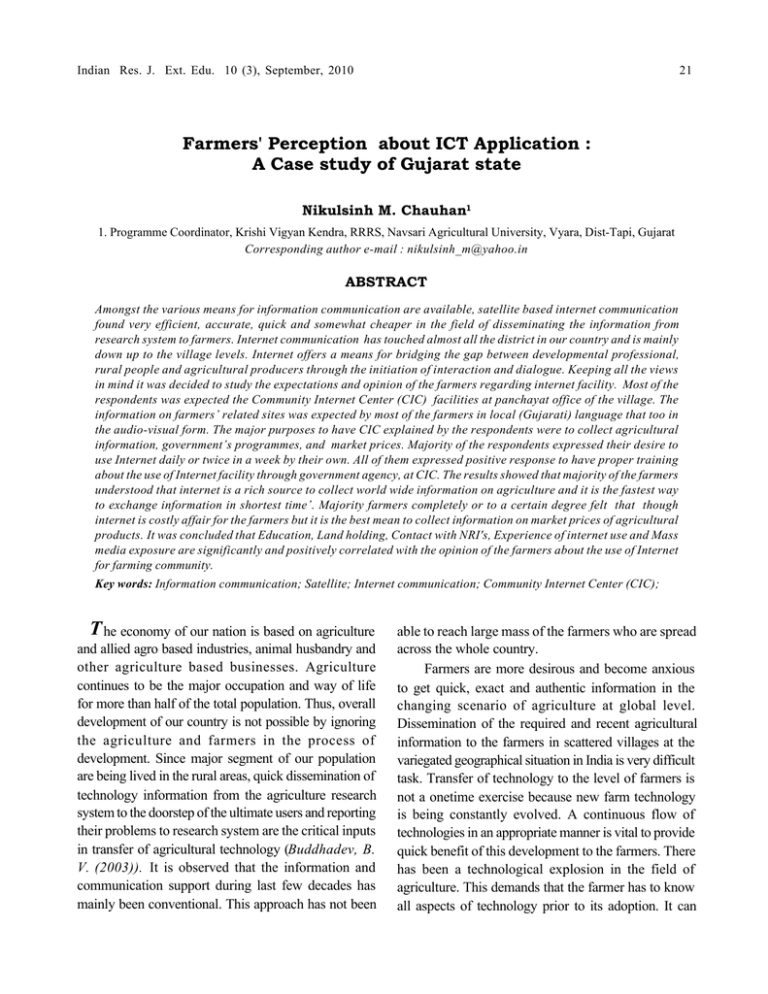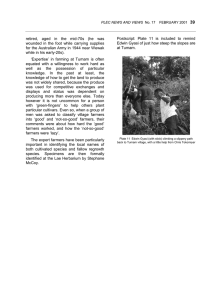Farmers` Perception about ICT Application
advertisement

Indian Res. J. Ext. Edu. 10 (3), September, 2010 21 Farmers' Perception about ICT Application : A Case study of Gujarat state Nikulsinh M. Chauhan1 1. Programme Coordinator, Krishi Vigyan Kendra, RRRS, Navsari Agricultural University, Vyara, Dist-Tapi, Gujarat Corresponding author e-mail : nikulsinh_m@yahoo.in ABSTRACT Amongst the various means for information communication are available, satellite based internet communication found very efficient, accurate, quick and somewhat cheaper in the field of disseminating the information from research system to farmers. Internet communication has touched almost all the district in our country and is mainly down up to the village levels. Internet offers a means for bridging the gap between developmental professional, rural people and agricultural producers through the initiation of interaction and dialogue. Keeping all the views in mind it was decided to study the expectations and opinion of the farmers regarding internet facility. Most of the respondents was expected the Community Internet Center (CIC) facilities at panchayat office of the village. The information on farmers’ related sites was expected by most of the farmers in local (Gujarati) language that too in the audio-visual form. The major purposes to have CIC explained by the respondents were to collect agricultural information, government’s programmes, and market prices. Majority of the respondents expressed their desire to use Internet daily or twice in a week by their own. All of them expressed positive response to have proper training about the use of Internet facility through government agency, at CIC. The results showed that majority of the farmers understood that internet is a rich source to collect world wide information on agriculture and it is the fastest way to exchange information in shortest time’. Majority farmers completely or to a certain degree felt that though internet is costly affair for the farmers but it is the best mean to collect information on market prices of agricultural products. It was concluded that Education, Land holding, Contact with NRI's, Experience of internet use and Mass media exposure are significantly and positively correlated with the opinion of the farmers about the use of Internet for farming community. Key words: Information communication; Satellite; Internet communication; Community Internet Center (CIC); T he economy of our nation is based on agriculture and allied agro based industries, animal husbandry and other agriculture based businesses. Agriculture continues to be the major occupation and way of life for more than half of the total population. Thus, overall development of our country is not possible by ignoring the agriculture and farmers in the process of development. Since major segment of our population are being lived in the rural areas, quick dissemination of technology information from the agriculture research system to the doorstep of the ultimate users and reporting their problems to research system are the critical inputs in transfer of agricultural technology (Buddhadev, B. V. (2003)). It is observed that the information and communication support during last few decades has mainly been conventional. This approach has not been able to reach large mass of the farmers who are spread across the whole country. Farmers are more desirous and become anxious to get quick, exact and authentic information in the changing scenario of agriculture at global level. Dissemination of the required and recent agricultural information to the farmers in scattered villages at the variegated geographical situation in India is very difficult task. Transfer of technology to the level of farmers is not a onetime exercise because new farm technology is being constantly evolved. A continuous flow of technologies in an appropriate manner is vital to provide quick benefit of this development to the farmers. There has been a technological explosion in the field of agriculture. This demands that the farmer has to know all aspects of technology prior to its adoption. It can 22 only be possible through the use of satellite based Internet technologies. Agriculture continues to be the major occupation and way of life for more than half of the total population. Thus, overall development of our country is not possible by ignoring the agriculture and farmers in the process of development. Since major segment of our population are being lived in the rural areas, quick dissemination of technology information from the agriculture research system to the doorstep of the ultimate users and reporting their problems to research system are the critical inputs in transfer of agricultural technology. It is observed that the information and communication support during last few decades has mainly been conventional. Amongst the various means for information communication are available, satellite based internet communication found very efficient, accurate, quick and somewhat cheaper in the field of disseminating the information from research system to farmers. Internet communication has touched almost all the district in our country and is mainly down up to the village levels. Internet offers a means for bridging the gap between developmental professional, rural people and agricultural producers through the initiation of interaction and dialogue. The number of satellite based Internet connection in Indian has crossed the two million mark and the number of telephone connections is over 320 million. Internet connectivity has touched almost all the districts in the country and is moving down up to the village levels (Aditya, 2003). Many pilot projects to connect rural community to cyber-space are underway at various locations. The initial response of the rural people, particularly farmers has been very encouraging; many organizations are trying to establish internet connectivity to make best use to satellite based communication technology. Keeping all the things in mind the present study has been undertaken with a view to know the Expectations of the farmers regarding Community Internet Centre (CIC) at village level as well as to study entitled opinion of the farmers regarding internet facility was carried out in Anand district of Gujarat state. Four village having more than 5000 population and comparatively sound infrastructure facilities were selected purposively. A list of progressive farmers was prepared with the help of village level worker from all Indian Res. J. Ext. Edu. 10 (3), September, 2010 the selected villages. Finally, 25 farmers were selected from each villages using simple random sampling technique. Thus, the study was confined to 100 farmers. METHODOLOGY The investigation was carried out in Anand district of Gujarat state because the district is agriculturally one of the more advanced districts. Farmers having good interaction with their relatives in foreign countries. Four villages Viz. Vasad, Mogar, Napad and Navli having more than 5000 population and comparatively sound infrastructure facilities were selected purposively. A list of progressive farmers was prepared with the help of village level worker from all the selected villages. Finally, 25 farmers were selected from each villages using simple random sampling technique. Thus, the study was confined to 100 farmers. Keeping in view the objectives of the study, data were collected using structured interview schedule prepared for the purpose. Statistical tools such as frequency and percent and co-efficient of correlation were employed to analyze the data. RESULTS AND DISCUSSION Profile of the respondents : It was observed that 64 per cent of the internet facility expecting farmers were from the middle age group, with a high school and higher secondary level of education (45 %) and had joint family. Sixty percent of the respondents belonged to the small category of farmers with mixed farming as main occupation. In order to earn additional income along with farming about 46 per cent of them possessed two or more animals. More than half of the respondents were found to be the member in one or more organizations. Expectation of the farmers about CIC: The data presented in Table 1 indicates that cent per cent of the respondents expected to have CIC at village level. It shows that farmers have realized importance of Internet facility in villages as an effective source of information as well as for the speedy communication. It can be observed from the data in Table 2 that Building of Panchayat was preferred by 95.00 per cent of the respondents, followed by building of primary school by 81.00 per cent, building of co-operative dairy by 76.00 per cent and buildings of high school and community hall by only 5.00 and 3.00 per cent respondents, Indian Res. J. Ext. Edu. 10 (3), September, 2010 respectively. The building of Panchayat is such an informal place, where people feel much familiarity, thus it was preferred by great majority of the farmers to have CIC. Table 1. The expectation of CIC at village level (N=100) S. No. Type of Expectation No. % 1 2 100 00 100 100.00 00.00 100.00 Yes No Total Table 2, Respondent according to choice of the place of CIC (N=100) S. No. Place No. % 1 Panchayat 95 95.00 2 3 4 5 Primary school Co-operative Dairy High school Community hall 81 76 05 03 81.00 76.00 05.00 03.00 23 The data in Table 3 indicate that operator or guide, printer, separate cabin, downloaded information in printed form and extra seating facilities were expected by 98.00, 72.00, 68.00, 63.00 and 53.00 per cent of the farmers, respectively. The data in Table 4 indicate that agriculture graduate with computer knowledge was preferred by nearly cent per cent (98.00%) of the farmers as a manager of the centre, followed by any educated person of the village was preferred by 76.00 per cent, expert of computer by 57.00 per cent and primary school teacher by 28.00 per cent of the farmers. With a view to knowing farmers’ choice of source to take initial financial support to start CIC, information was collected and presented in Table 5. The first choice of the farmers to take initial financial support to start CIC was Government agencies followed by cooperative societies, villagers sharing, voluntary donation and foreign relatives. Chauhan. (2010) also reported the same. Table 3. The respondents according to expectation of service (N=100) S. No. Expectation of service No. % 1 98 98.00 2 3 4 5 Operator/Person to Guide and help Printer Separate cabin Collected information in printed form Extra seating facilities 72 68 63 72.00 68.00 63.00 53 53.00 Table 4. Respondents according to choice of person to manage CIC (N=100) S. No. Person No. % 1 98 98.00 76 57 28 76.00 57.00 28.00 2 3 4 Agriculture graduate with computer knowledge Educated person of village Expert of computer Primary school teacher Table 5. Respondents according to their expectation of provision of financial facility (N=100) S. No. Institution No. Rank 1 2 3 4 5 2.00 0.92 0.07 0.65 1.45 I III V IV II Government Co-operative societies By villagers’ sharing Voluntary Donation Foreign relatives Table 6: The respondents as per the choice to bear expenses to run CIC (N=100) S. No. Responsible for expenditure No. Rank 1 Government 1.60 I 2 3 4 Village Panchayat Co-operative Dairy By collecting charges from users 1.02 0.92 0.79 II III IV Table 7: the Respondents’ choice to have minimum computer sets at CIC (N=100) S. No. 1 2 3 4 Internet set 1 to 2 3 to 4 5 to 6 More than 6 Total No. 00 00 22 78 100 % 0.00 00.00 22.00 78.00 100.00 The information regarding choice of the farmers to bear expenses to run CIC was also collected and presented in Table 6. It can be seen that respondents said that Government should bear expenses to run CIC, at the same time other preferences given by them to bear expenses to run CIC were village Panchayat, cooperative dairy and collecting charges from users.Respondents were also asked to give there expectation regarding number of internet connected sets of computers (Table 7). Majority of the farmers (78%) 24 Indian Res. J. Ext. Edu. 10 (3), September, 2010 suggested that more than six sets should be there at CIC while 22.00 per cent expected 5 to 6 sets of internet connected computer sets at CIC. Table 8. Respondents choice on form of information on internet and ICT (N=100) S. No. Type of information Mean value Rank 1 2 1.98 1.94 I II 1.91 1.42 1.20 III IV V In Gujarati language Photographs with written form Audio-visual form Written information Audio form 3 4 5 Table 9. Respondents according to their purposes to have CIC (N=100) S. No. Purpose 1 2 3 4 5 6 7 8 9 10 To collect agricultural information To collect information on Government’s Programmes For speedy communication For exchange information For entertainment To collect information for their children’s education To contact foreign relatives To contact relatives in India To know information on agriculture of developed county To know more about market prices Mean value 1.71 1.64 Rank 1.61 1.21 1.11 0.74 III IV V VI 0.67 0.64 0.56 VII VIII IX 0.51 X I II Table 10. Respondents’ wish to involve in the process of exploring internet (N=100) S. No. Way of internet use No. % 1 2 78 22 100 78.00 22.00 100 By own With the help of others Total Table 11. Respondents expected frequency to use internet at CIC (N=100) S. No. Frequency to use ICT No. % 1 2 2 3 4 5 32 31 06 03 00 28 100 32.00 31.00 06.00 03.00 00.00 28.00 100.00 Daily Twice in a week Once in a week Once on fortnight Once in month Whenever needed Total It can be seen from Table 8 that most of the farmers was expected information in Gujarati language that too in the form of photographs and written form on agricultural related webs as well as on ICT. At the initial stage if it is difficult to provide information on most expected form, thus many of them were also expected information in audio-visual form, written form and audio form.The data presented in Table 9 reveals that the major uses of internet expected by the respondents were to collect agricultural information, to collect information on government’s programmes, for speedy communication, for exchange information, for entertainment, to collect information for their children’s education, to contact foreign relatives, to contact relatives in India, to know information on agriculture of developed county and to know more about market prices (Buddhadev, 2003). The farmers are ready to use Internet for agricultural information but on majority of the agricultural sites, information is available in English language so they are not in opposition to use it. Thus, all State Government should launch farmers’ related sites in local languages. Many State Governments have initiated their efforts in this direction. The result Table 10 shows that farmers have real interest to be a part of Internet communication process thus, majority (78.00%) of the respondents were expecting to use Internet by their own while, 22.00 per cent were wanted to use it with the help of others. The expected frequency of the farmers to use Internet facility at CIC was measure. The result (Table 11) indicates that majority (63.00%) of respondent were expecting to use internet at CIC daily or twice in a week, followed by 28 per cent whenever needed, 06.00 per cent once in a week and 3.00 per cent once in a fortnight. Thus it can be said that favorable expectation was observed among the farmers to use Internet at CIC. Table 12. Respondents expected agency to receive training to use CIC (N=100) S. No. Agency No. % 1 2 3 4 5 Government Co-operative society NGOs Gram Panchayat Agricultural University 70 04 02 11 13 70.00 04.00 02.00 11.00 13.00 Total 100 100.00 Indian Res. J. Ext. Edu. 10 (3), September, 2010 25 Table 13. Opinion of the respondents about use of internet facility (N=100) S.. Statements Opinion (%) No. 1 2 3 4 5 6 7 8 9 10 Internet can be a very useful mean to the farmers during present time Internet is rich source to collect worldwide information on agriculture and allied fields Internet is fastest way to exchange information in shortest time Internet is costly affair for the farmers Internet is best mean to collect information on market prizes of agricultural product The use of Internet is nothing other than time pass activity Information available on Internet is easy to understand Development of Indian farmers is possible through internet I wish that my children should make positive use of internet facility I wish that farmers should make use of internet Table 14. Relationship between profile of the farmers and their opinion about internet S. No. Independent variables I Personal variable 1 2 II 3 4 5 6 III 7 8 9 10 11 12 Age Education Economic variable Occupation Land holding Animal wealth Modern agricultural equipment Social and communication Type of family Contact with NRI's Experience of internet use Mass media exposure Extension contact Organization participation Correlation coefficient ("r" value) 0.1368 0.3263* -0.0092 0.2459* 0.0195 -0.0087 -0.2472* 0.2603* 0.2718* 0.2462* 0.1239 0.1247 * Significant at 0.05 level of probability The data presented in Table 12 indicate that majority (70.00%) of respondents expected training through government agency, followed by 13.00 per cent expected training by Agricultural University, 11.00 per cent respondents by Gram Panchayat. Only 4.00 and 2.00 per cent of them expected such training by co-operative society and NGOs. The data presented in Table 13 indicated that 71.00 per cent of the farmers understood that internet is a rich source to collect world wide information on Agree Partially agree Disagree 69.00 71.00 10.00 12.00 21.00 17.00 72.00 41.00 41.00 14.00 24.00 35.00 14.00 35.00 24.00 28.00 12.00 56.00 81.00 81.00 21.00 41.00 30.00 10.00 19.00 61.00 47.00 14.00 09.00 00.00 agriculture and its allied fields, while 72.00 per cent supported to the statement that ‘Internet is fastest way to exchange information in shortest time’. Looking to the present cost involved in this technology, it is not easy for the farmers to have this facility individually at his home, thus, 65.00 per cent of the farmers completely or to a certain degree felt that internet is costly affair for the farmers. Internet is best mean to collect information on market prizes of agricultural products but as it is being new system for our farmers, mix opinion was observed for this aspect and it was observed that 41.00 per cent of the farmers realized its use for agricultural marketing while 35.00 per cent partially realized it and nearly one fourth (24.00%) of them did not realize this feature of internet. Chauhan and Chauhan, (2006) also reported the same results. The results point out that majority (69.00%) of the respondents agreed with the statement that “Internet can be a very useful mean to the farmers during present time”. It was exciting to note that majority (61.00%) of the farmers did not believe that use of internet is only time pass activity. It means that they opined it as a useful medium for farming community. Of course, farmers are not in position to use this information for the development of their agriculture because whatever sites available on agriculture are in English language. This fact was reflected in study so 88.00 per cent of the farmers partially or absolutely realized that information available on Internet is difficult to understand. It was really pleasing to note that majority (86.00%) 26 Indian Res. J. Ext. Edu. 10 (3), September, 2010 of the farmers out of them 56.00 per cent totally and 30.00 per cent partly assumed that development of Indian farmers is possible through Internet. Internet is best mean to learn all now things for young generation, thus, 82.00 per cent of the farmers were wishing their children to make positive use of internet at the same time 81.00 per cent of them had opinion that farmers should make use of internet. The perusal of the data in Table 14 revealed that out of the 10 independent variables, five variables like Education, Land holding, Contact with NRI's, Experience of internet use and Mass media exposure were observed positively significant while, remaining five variables such as type of the family was observed negatively significant with the opinion of the farmers about the use of Internet for farming community. The independent variables like Age, Occupation, Animal wealth, Modern agricultural equipment, Type of family, Extension contact and Organization participation were observed non significant with the opinion of the farmers about the use of Internet for farming community. CONCLUSION Cent per cent respondent was expected the Community Internet Centre (CIC) facilities at village level. Slightly less than cent per cent of them preferred Panchayat office as the best place of CIC and they were expecting agriculture graduate with computer knowledge as operator or guide at CIC. The respondents expressed that there should be more than six sets of computer, further they expect that Government should bear expenses to run CIC. The information on farmers’ related sites was expected by most of the farmers in Gujarati language that too in the audio-visual form. The major purposes to have CIC explained by the respondents were to collect agricultural information, to collect information on government’s programmes, to speedup communication, to exchange information, and to know more about market prices. Majority of the respondents expressed their desire to use Internet daily or twice in a week by their own .All the respondents expressed positive response to have proper training about the use of Internet facility through government agency, at CIC for sustainable agricultural development. It can be concluded from the results that out of the 10 independent variables, five variables like Education, Land holding, Contact with NRI's, Experience of internet use and Mass media exposure are significantly and positively correlated with the opinion of the farmers about the use of Internet for farming community. More than 70 per cent of the farmers opined that internet is the rich source and fastest way of exchanging information in short time. It must be use by the farming community for their betterment. REFERENCES 1. Aditya, V. P. S. (2003). ICT for knowledge sharing and enabling supply chain for green produce and products, Paper presented at the National Workshop on “ICT for Agriculture and Rural Development” organized by IAIT in Agri. and DA-IICT, Gandhinagar (Gujarat), India on 18th December 2003. 2. Buddhadev, B. V. (2003). Crop Production Information System for farmers, Paper presented at the National Workshop on “ICT for Agriculture and Rural Development” organized by IAIT in Agri. and DA-IICT, Gandhiagar (Gujarat), India on 18th December 2003. 3. Chauhan, N. M. and Chauhan, N.B. (2006). Farmer’s Opinion about use of Internet Technology in Agriculture at village level. Paper presented in National Seminar on Information & Communication Technology: Opportunities and Challenges for Revitalizing Extension System ,December 27-29, 2006 at NAU, Navsari, Gujarat, held by ISEE. 4. Chauhan, Nikulsih M. (2010). Expectations of the farmers from ICT in agriculture. Indian Res. J. Ext. Edu., 10 (1) : 42-45





